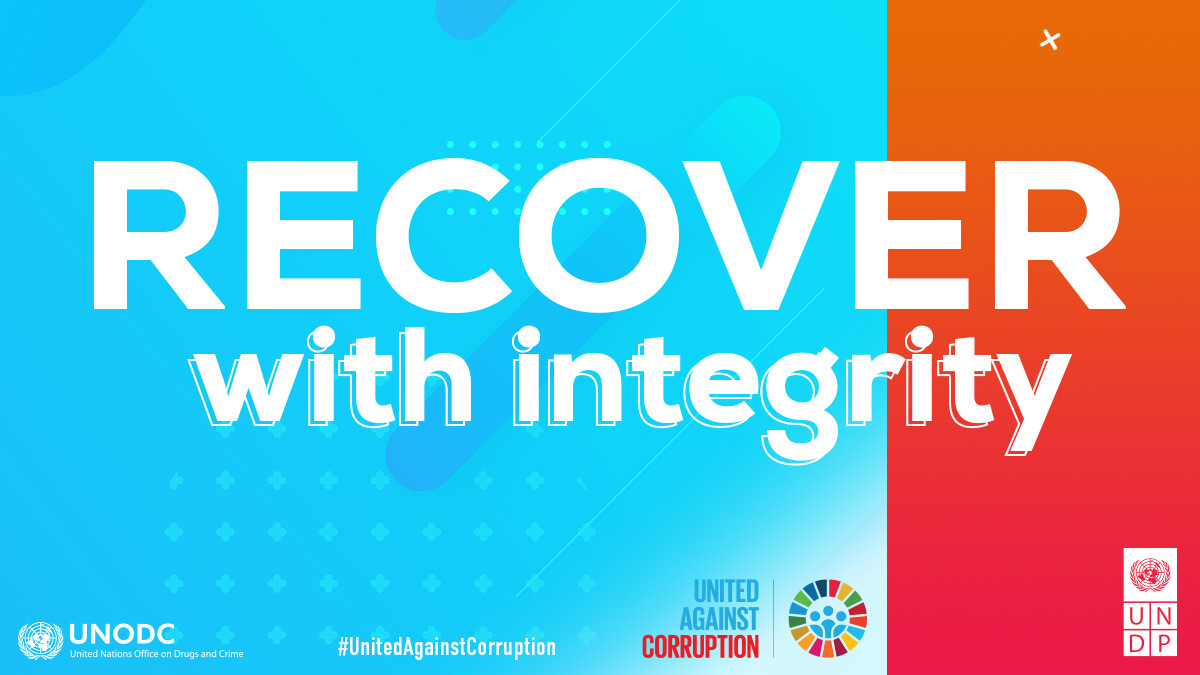#UnitedAgainstCorruption this International Anti-Corruption Day 9 December 2020
SAMED proudly supports International Anti-Corruption Day which is observed annually on 9 December. This is an opportunity to amplify voices and mobilise action against corruption as a prolific and multidimensional phenomenon that undermines progress across the globe.
As South Africa has seen only too well, corruption thrives in a crisis, and the COVID-19 pandemic provided fertile ground for corrupt and unethical exploitation of the situation which demanded rapid and extraordinary responses.
The UN-set 2020 theme for the day – Recover with integrity – acknowledges the social and economic casualties of the COVID-19 health crisis and emphasises that an inclusive recovery can only be achieved with integrity and accountability.
Risks associated with emergency procurement of medical essentials including personal protective equipment (PPE), diagnostic tools and ventilators became apparent to SAMED in the early weeks of the pandemic.

Through the establishment of a special COVID-19 committee, SAMED geared up to work with members and external stakeholders to address supply, regulatory and procurement challenges. These mutually dependant aspects of providing medtech are inseparable from safety and quality of the products and can be the difference between life and death.
Specifically, this year SAMED has collaborated with government – National Treasury, the dtic, Department of Health, SAHPRA and through B4SA, the business community – to jointly formulate and assist with implementing best practices for smart, transparent, value-based healthcare and outcomes-based procurement of medtech. These are the tenets of resilient health systems characterised by quality healthcare, efficient use of health resources, enhanced competition and innovation and reduced fraud, waste and corruption.
During these engagements, we continue to advocate for capacity building to regulate, procure and conduct post-market surveillance of medical technology and related equipment.
Other responses from SAMED to improve ethical practices, ensure accountable, effective and efficient procurement and confront corruption include:
- Member engagement: Since the outset of the pandemic, SAMED advised members on national COVID-19 policies, underscoring their relevance to members and the Medical Device Code of Ethical Marketing and Business Practices which is binding on all SAMED members.
- Stakeholder advocacy: SAMED prepares and disseminates the MedTech Insider with thought-leadership articles and participates in events hosted by different stakeholders. This year, these platforms included the Competition Commission, the Gordon Institute of Business Studies (GIBS) and Wesgro. We encourage members and stakeholders to attend webinars hosted by the Health Sector Anti-Corruption Forum (HSACF) and other organisations. The objective is to highlight the need for more robust, better resourced and capacitated medtech regulatory and procurement systems.
- SAMED 2020 conference: The programme accentuated the learnings and relationships built during the COVID-19 emergency to strengthen the future health system, reshape South African healthcare and increase the use of medtech, digital technology and other innovations in a responsible and transparent manner that improves patient outcomes.
- Regulations: COVID-19 exposed the need for agile, transparent, online data-enabled systems for regulation of medtech. SAMED facilitated engagements between SAHPRA and both our members and the medtech industry more broadly to create new and strengthen existing guidelines and policies on testing, validation, approvals and post-market surveillance of essential medical technology products. SAMED supported the Competition Commission response to inflated pricing of PPE and strongly condemned corruption and supply of sub-quality products.
- Mass media: SAMED was frequently present in the media, where we used statements and interviews to condemn fraud and corruption and advocate for correct practices and approaches.
While the procurement of specific medical products attracted particular attention during the year, it also gave us important learnings to take forward.
Many South African medtech suppliers are SMEs and even those operating in the COVID sphere encountered business challenges including cash-flow, stock management, freight and access to the market issues. Elective surgery and other non-COVID medical treatments that were cancelled in a bid to contain the virus had a significant knock-on effect on the sustainability and growth of the sector. In addition, government efforts to pass and implement disaster management legislation and regulations were welcome – but insufficient policy alignment and consultation in certain areas affected services and compounded economic losses.
COVID-19 brought home the value of quality medtech and our industry’s contribution towards healthier people and a healthier economy. SAMED will continue to champion governance and ethics and work with our members, government, healthcare practitioners and policy makers, and other role players to advance solutions that make procurement in the health sector more effective, transparent and protected from corruption. That is the meaning of “recover with integrity” and SAMED is committed to championing this cause.

